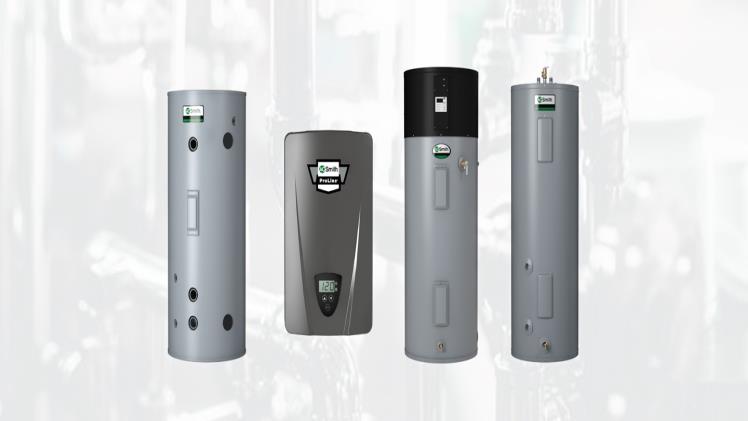Water Heaters | Costs, Types, and When to Upgrade

Hot water is one of those things you don’t think about, until it’s gone. Whether you wake up to a cold shower or your business needs hot water for customers, a broken water heater can cause problems in your daily life quickly. And when it happens, you’re left with a question that’s both urgent and expensive: repair or replace?
Water heaters, like all man-made machines, have a lifespan. A traditional tank-style unit will generally serve you for 8 to 12 years before performance starts to decline, while a tankless water heater (often seen as the premium choice) can last up to 20 years with the right maintenance.
But longevity isn’t everything. Over time, efficiency wanes, energy bills creep higher, and random leaks can cause expensive water damage. At some point, replacement is no longer a choice, you just have to do it.
How Much Does It Cost to Replace a Water Heater?
Replacing a water heater is about investing in comfort, efficiency, and peace of mind. But how much should you expect to pay? The cost varies depending on the type of unit, labor, and potential modifications needed to bring your system up to code. Most brands are pretty similar in price though not varying too much.
Tank-Style Water Heaters
Traditional storage water heaters remain the most common option for homeowners and businesses. Their costs upfront are lower than tankless models, but they also consume more energy since they continuously heat water.
- With tanked, expect to pay anywhere from $400 to $2,300, depending on size, efficiency, and brand.
- Professional installation, including labor, permits, and disposal, will bring your total cost between $1,200 and $4,000.
- The national average is about $1,293, according to industry sources. However, prices can change based on location, complexity, and special service.
Tankless Water Heaters
If you’re looking for efficiency and an endless supply of hot water, a tankless system might be the right choice. These units heat water on demand, meaning they don’t waste energy maintaining a reservoir of hot water all day everyday.
- Generally, tankless heaters fall between $1,200 and $3,500.
- The installation cost is higher because you need better venting or electrical work. This makes the total cost more than a regular tank model.
- Tankless water heaters offer lower energy consumption helping offset the upfront investment, especially in households with high hot water usage.
Hybrid/Heat Pump Water Heaters
For those who prioritize energy efficiency, hybrid water heaters are an intriguing option. By leveraging heat pump technology, these units use less electricity to heat water, reducing monthly energy bills.
- With hybrids, expect to pay between $1,500 and $3,000 or more.
- This is for property owners aiming to benefit from long-term energy savings.
- Although they cost more upfront, Mmny utility companies and government programs offer rebates for efficient models.
Additional Cost Factors
Beyond the unit itself, there are several other expenses to consider when looking at a water heater:
- Depending on your location, installation labor can range from $45 to $350 per hour.
- Some municipalities require permits, adding $25 to $300 to your overall cost.
- Hauling away and properly disposing of your existing water heater can add another $50 to $150.
When Should You Replace Your Water Heater?
Knowing when to replace a water heater is just as important as understanding the costs. The biggest mistake homeowners make is waiting too long, often until they’re faced with an emergency situation where they end up making rash decisions that cost more money.
The biggest mistake homeowners make? Waiting too long. If your unit is between 9 and 15 years old, showing signs of rust, leaking, or providing inconsistent hot water, replacement should be on your radar. A minor repair might buy time, but if you’re frequently calling for service or noticing a spike in energy costs, replacing the unit is likely the smarter financial move.
DIY vs. Professional Installation
Many homeowners wonder if installing a new water heater is a DIY-friendly job. The truth? It depends.
DIY Installation
If you’re comfortable with basic plumbing and electrical work, you might be able to save money on labor. However, improper installation can void warranties, lead to safety hazards, and in the case of gas models, create dangerous carbon monoxide leaks. Proceed at your own risk.
Professional Installation
Hiring a licensed professional takes the weight off of your shoulders and leaves it to the professional to figure out. A skilled installer will handle permits, follow code compliance, and provide safe operation. While this route costs more, it often includes warranty coverage and peace of mind knowing it’s less of a problem for you and more for the installer.
What’s Next? The Future of Water Heaters
Technology is changing the way we heat water. Smart water heaters now integrate with home automation systems, allowing remote monitoring and control via smartphone apps. Our plumbing and heating company uses the newest condensing and heat pump models setting new standards for energy savings for both time and money. Some cities, including our own base city Missoula, are even phasing out gas-powered water heaters in favor of electric and hybrid models, backed by generous rebates and tax incentives.
Making a Smart Investment
Replacing a hot water heater isn’t just about finding the best deal, it’s about finding what’s best for your situation. Sometimes paying more upfront pays dividends in years to come. Here are some things to keep in mind:
- A standard tank replacement will cost between $1,200 and $2,100, while tankless models can run $1,200 to $3,500 or more.
- Energy-efficient models may have higher upfront costs but pay for themselves over time.
- While DIY installation is possible, hiring an expert ensures safety and compliance with local codes.
- Many states and utility companies offer incentives for high-efficiency water heaters.
Understanding your options puts you in control. Choose wisely, and your water heater will serve you efficiently for years to come. These days, hot water is a necessity. Invest in the right system, and you’ll enjoy reliability, lower energy costs, and peace of mind.



